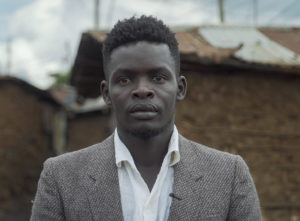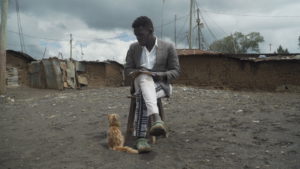Stories
Hassan’s Journey to Becoming a Citizenship Rights Advocate
HIGHLIGHT: Hassan, a Nubian youth living in Kibra, narrates the challenges he went through in his quest to get a Kenyan national identity card (ID) and how Nubian Rights Forum, a Namati partner, helped him finally get an ID. His struggles, shared by thousands of other members of the same community, made him see the important role of a community paralegal, which he eventually became to help others.
It was a gray, November morning in the informal settlement of Kibra. Hassan Noor Said, a 24-year-old Nubian, sat on a stool in a muddy clearing used partly as a dumping ground for the hundreds of mud-walled houses that surrounded him.
He has donned a light brown, woolen blazer and off-white shirt for a video shoot he is about to participate in as part of the Global Pluralism Award nomination of Namati Kenya’s citizenship program.
The program advocates for inclusivity, fairness and accessibility in legal identification systems that have marginalized communities such as the Nubians living in Kenya.

Hassan struggled for years to secure his ID due to systemic discrimination
Hassan’s search for identity started in 2018 when he was 20 years old and had just joined a local college to pursue studies in food and beverage. By then, he was already two years late; the normal age for Kenyans to acquire an ID is 18 years old.
Despite joining the college using his birth certificate as identification, he was unable to sit his exams without a national identity card. He was forced to drop out and lost the sponsorship he received from a well-wisher.
Losing the scholarship devastated him, but it was just the beginning of his lack of ID challenge.
“The biggest challenge was not having proper documentation to get a job. Every time I would say I’m a Nubian a potential employer would think I’m a foreigner and would decline to consider me for the job,” Hassan said.
“My community has not yet been recognized in Kenya, and we are fighting so that the government can acknowledge there is a community known as Nubians.”
Nubians have lived in Kenya for over one-and-half century, ever since their ancestors, from a territory that is the current Sudan, were brought to East Africa as a regiment of the British colonial armed forces.
While a 2019 government census data estimates the Nubian population to be about 21,000, others estimate there could be many more scattered in different parts of Kenya. In Nairobi, the largest population of Nubians live in Kibra, one of the largest informal settlements in Africa, where they were settled by the British.
Despite being in Kenya even before the country got independence in 1964, the Nubian community is still not recognized as one of the country’s official tribes. Lack of recognition has meant they face discriminatory hurdles when seeking legal identification documents such as birth certificates, IDs, and even death certificates.
They also face lengthy and costly procedures, which include vetting by a panel of government officials and security agents, that make it hard for many to get their citizenship documentation.
“Nubians are only allowed to apply for IDs on Tuesdays and Thursdays, which means that if you are held up on those two days of the week you won’t be considered any other day. This is very limiting,” said Hassan.
“There is also vetting by government officials and security agents. It is very intimidating and subjective. It makes one wonder if getting an ID is worth the struggle.”
For Hassan and other Nubians in Kenya, a lack of legal identification means that they cannot get jobs, secure government services, access educational institutions, or even obtain a bank or mobile money account.
“I used to keep my money under the mattress, which was risky,” Hassan said, recalling a time when he ran a potato fries business.

Hassan sits in an open field in Kibera, next to his cat named Prince. November, 2021.
With the help of community paralegal at the Nubian Rights Forum (NRF), one of Namati’s partner organizations in the country, Hassan was able to understand laws related to citizenship, receive support to go through the application steps and eventually got his ID in February 2020 — more than two years after first seeking the document.
He says his life, since getting an ID, has changed for the better. With his identification, he was able to open a bank account, register for mobile banking and expand his potato chips business.
Hassan also became interested in paralegal work to help others in the Nubian community to gain identification that will bestow them with their full citizenship rights.
“After going through the process with the NRF paralegals, I wanted to also become a paralegal and I went through training with Namati … [Now] I’m able to advocate for the rights of my community,” he said.

)
)
)